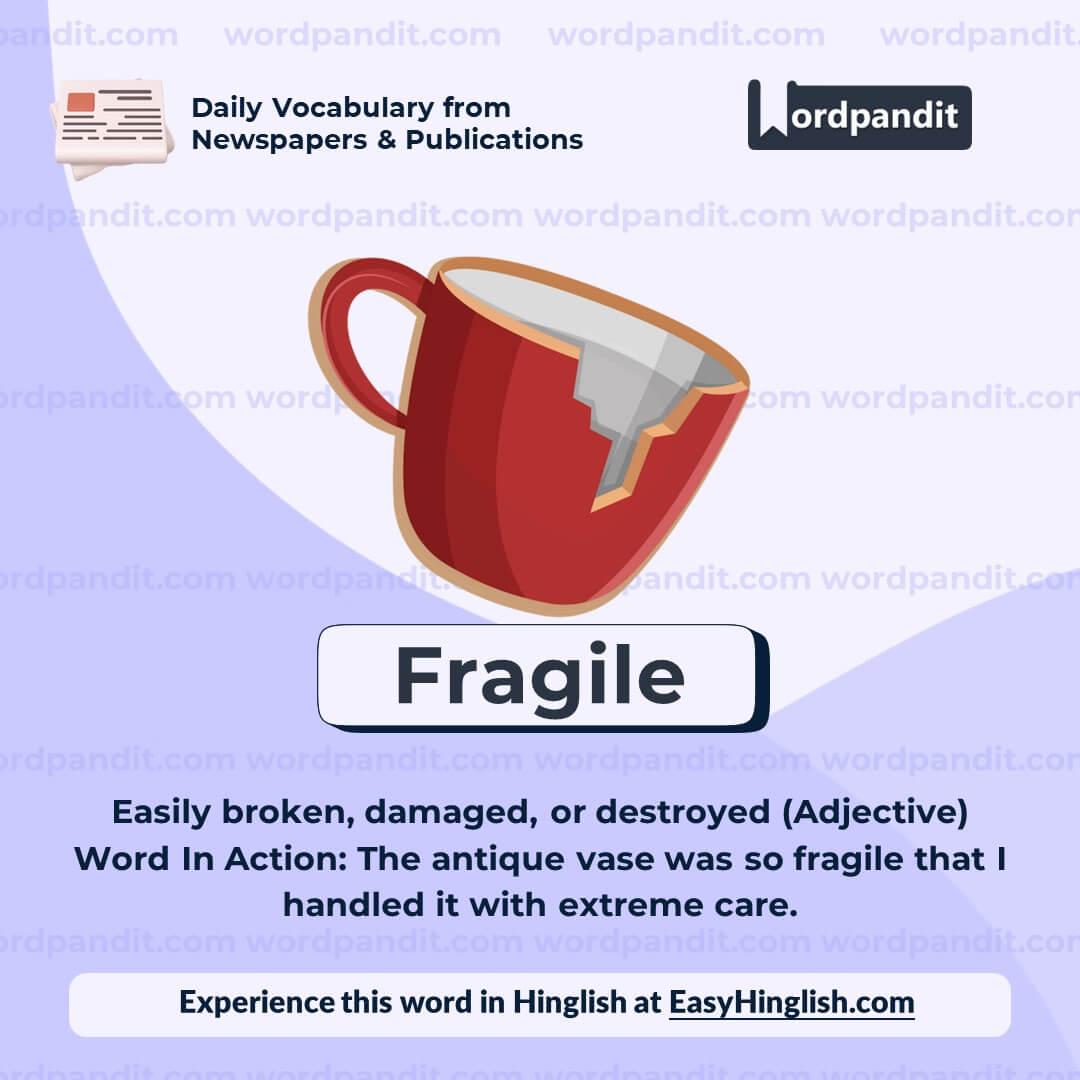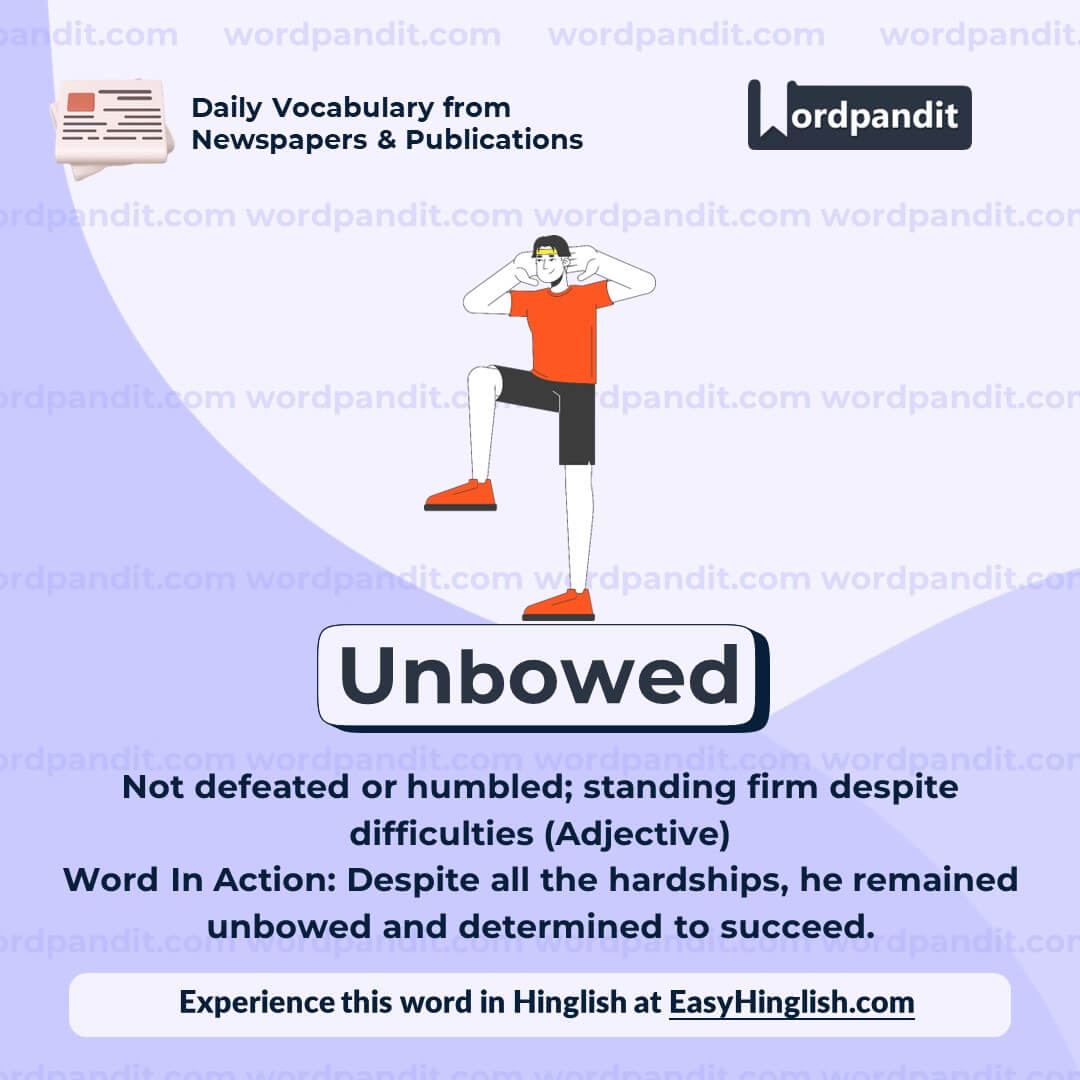Daily Vocabulary from Indian Newspapers and Publications
Welcome to Wordpandit’s Indian Vocabulary Hub
At Wordpandit, we understand the importance of staying rooted in the local context while expanding your language skills. This section focuses on enriching your vocabulary with words and phrases drawn from India’s leading newspapers and publications, ensuring you're learning vocabulary that is practical, relevant, and uniquely Indian.
Why Indian Sources Matter
We believe that the best way to master any language is by immersing yourself in local content. That’s why we carefully curate vocabulary from top Indian publications, including:
- The Hindu
- The Times of India
- The Economic Times
- Hindustan Times
- Live Mint
- The Indian Express
- And many others...
Stay Updated, Stay Relevant
With daily updates from Indian news sources, you’ll be consistently learning words that reflect the trends and shifts in Indian society and culture. Our focus is to provide vocabulary that enhances your understanding of the language in an Indian context.
How Wordpandit Supports Your Goals
Whether you’re preparing for exams, aiming to improve your professional communication, or simply want to stay connected with the latest Indian vocabulary, Wordpandit is here to guide you every step of the way.
Learn with a Practical Approach
Our interactive learning methodology includes real-world examples, engaging activities, and context-specific usage to ensure that every word becomes part of your active vocabulary.
Dive into Indian Vocabulary Today!
Why Choose Wordpandit?
Practical Learning: Focus on words you'll actually encounter in real-world reading, enhancing your comprehension and communication skills.
Diverse Content: From current affairs to scientific breakthroughs, our varied sources expose you to vocabulary across multiple domains.
Effortless Integration: Make Wordpandit a part of your daily routine. Just a few minutes each day can significantly boost your lexicon over time.
Your Path to Vocabulary Mastery
- Visit our Daily Vocabulary section regularly
- Explore new words and their usage in context
- Practice incorporating these words into your own writing and speech
- Track your progress as your vocabulary expands
Start Your Journey Today
Embark on your vocabulary enhancement journey with Wordpandit. By consistently engaging with our daily posts, you'll build a robust vocabulary that serves you well in academic, professional, and personal contexts.
Remember, a word a day keeps linguistic limitations at bay. Make Wordpandit your daily companion in the quest for vocabulary excellence!
WORD-1: Fragile
Context:
"Now, as a fragile ceasefire holds and as Israel and Hamas prepare for negotiations to extend the truce, four rival models for Gaza’s future have begun to take shape." - Telegraph India
Explanatory Paragraph:
The word "fragile" describes something that is delicate, weak, or easily broken. It can refer to physical objects, emotions, relationships, or situations. In the context above, "fragile ceasefire" means that the ceasefire is unstable and could break down at any moment. This word is often used to emphasize vulnerability and the need for careful handling.
Meaning: Easily broken, damaged, or destroyed (Adjective)
Pronunciation: FRAJ-uhl / FRAJ-ahyl
Difficulty Level: ⭐⭐ (Beginner-Intermediate)
Etymology: Derived from the Latin word "fragilis," meaning "easily broken," which comes from "frangere," meaning "to break."
Synonyms & Antonyms:
Synonyms: delicate, breakable, brittle, frail, weak
Antonyms: sturdy, strong, durable, resilient, tough
Usage Examples:
- The antique vase was extremely fragile and had to be handled with great care.
- After the heated argument, their friendship felt more fragile than ever.
- The economy remains fragile after the financial crisis.
- His fragile confidence was shattered by the harsh criticism.
Cultural Reference:
"Life is fragile. We're not guaranteed a tomorrow, so give it everything you've got." - Tim Cook
Think About It:
What are some things in life that are metaphorically fragile? How can they be strengthened?
Quick Activity:
Write a short paragraph using "fragile" in two different contexts—one describing a physical object and another describing an emotional state.
Memory Tip:
Think of the word "fragile" as related to "fracture"—both involve breaking. If something is fragile, it can easily fracture!
Real-World Application:
"Fragile" is commonly used in international relations, environmental discussions, and personal well-being. Understanding its use can help in analyzing news articles, discussing personal relationships, and evaluating delicate situations in business and politics.
WORD-2: Unbowed
Context:
"Hamas, weakened but unbowed, still controls most of the territory and is trying to entrench that authority." - Telegraph India
Explanatory Paragraph:
The word "unbowed" describes someone or something that remains strong, resilient, and unyielding despite difficulties or hardships. It often conveys a sense of defiance or perseverance in the face of adversity. In the given context, "weakened but unbowed" means that although Hamas has suffered setbacks, it has not surrendered or lost its determination.
Meaning: Not defeated or humbled; standing firm despite difficulties (Adjective)
Pronunciation: un-BOUD
Difficulty Level: ⭐⭐⭐ (Intermediate-Advanced)
Etymology: From "un-" (not) + "bowed" (past participle of "bow," meaning to bend or submit). The word implies someone who refuses to submit or yield.
Synonyms & Antonyms:
Synonyms: resilient, undefeated, unyielding, defiant, steadfast
Antonyms: defeated, submissive, yielding, broken, humbled
Usage Examples:
- Despite years of hardship, she remained unbowed and continued fighting for justice.
- The unbowed spirit of the revolutionaries inspired generations to come.
- Even after the crushing loss, the team stood unbowed, ready for the next challenge.
- The unbowed leader refused to accept the unjust terms of the treaty.
Cultural Reference:
"I am the master of my fate: I am the captain of my soul." – From the poem *Invictus* by William Ernest Henley, which reflects an unbowed spirit in the face of adversity.
Think About It:
Can you think of a historical or fictional figure who remained unbowed in the face of adversity? What made them resilient?
Quick Activity:
Write a short paragraph describing a moment in your life when you felt unbowed despite challenges.
Memory Tip:
Imagine someone refusing to bow, standing tall and firm. "Unbowed" means they have not given in!
Real-World Application:
The word "unbowed" is often used in political speeches, motivational writing, and news reports to describe individuals or groups who persist despite opposition. Understanding this word can help in analyzing leadership qualities and resilience.
WORD-3: Thoroughfare
Context:
"At Israel’s invitation, they are running a checkpoint on a crucial thoroughfare in northern Gaza, screening vehicles for weapons." - Telegraph India
Explanatory Paragraph:
The word "thoroughfare" refers to a major road or pathway that allows movement through an area, typically used for transportation and traffic. It is often a key route connecting different places. In the given context, "a crucial thoroughfare in northern Gaza" implies that this road is an essential passageway for movement and logistics in that region.
Meaning: A main road or public highway allowing passage (Noun)
Pronunciation: THUR-oh-fair / THUH-ruh-fair
Difficulty Level: ⭐⭐⭐ (Intermediate-Advanced)
Etymology: Derived from Middle English "thorowfare," meaning "a passage through," which comes from Old English "thurh" (through) + "fare" (journey or passage).
Synonyms & Antonyms:
Synonyms: highway, boulevard, main road, avenue, route
Antonyms: dead end, cul-de-sac, alley, path
Usage Examples:
- The city widened the thoroughfare to ease traffic congestion during rush hour.
- The marketplace was located along the main thoroughfare, attracting many visitors.
- During the parade, police closed off the major thoroughfares in the downtown area.
- The old town had narrow streets, but the new district was designed with broad thoroughfares.
Cultural Reference:
Broadway in New York City is one of the most famous thoroughfares in the world, known for its theaters, entertainment, and historical significance.
Think About It:
How do major thoroughfares impact the economic and social development of a city?
Quick Activity:
List three major thoroughfares in your city or country and describe their significance.
Memory Tip:
Break the word into "thorough" (complete) + "fare" (passage), meaning a road that allows thorough movement.
Real-World Application:
Understanding the concept of thoroughfares is useful in urban planning, navigation, and discussions about transportation infrastructure. Major roads play a crucial role in commerce, emergency response, and city development.
WORD-4: Ordnance
Context:
"Hamas security officials have also re-emerged to assert a semblance of order across the territory, stopping and screening vehicles and trying to defuse unexploded ordnance." - Telegraph India
Explanatory Paragraph:
The word "ordnance" refers to military supplies, particularly weapons, ammunition, and explosives. It is commonly used in military and security contexts to describe artillery, bombs, and other war-related materials. In the given context, "unexploded ordnance" means bombs or explosives that have not yet detonated, posing a serious risk to people and infrastructure.
Meaning: Military weapons, ammunition, and explosives (Noun)
Pronunciation: ORD-nuhns
Difficulty Level: ⭐⭐⭐ (Intermediate-Advanced)
Etymology: Derived from Middle English "ordinance," meaning "military supplies," which comes from Old French "ordenance" (arrangement, preparation).
Synonyms & Antonyms:
Synonyms: ammunition, weaponry, munitions, arms, artillery
Antonyms: disarmament, demilitarization, peace tools
Usage Examples:
- The army transported heavy ordnance to the battlefield in preparation for the offensive.
- Experts were called in to safely remove the unexploded ordnance found in the old war zone.
- The military base has an ordnance storage facility where weapons are kept securely.
- Ordnance specialists are trained to handle and dispose of explosive materials safely.
Cultural Reference:
During World War II, large quantities of unexploded ordnance (UXO) were left behind, and many are still being discovered today, requiring bomb disposal experts to safely remove them.
Think About It:
What are the long-term effects of unexploded ordnance in war-affected regions?
Quick Activity:
Find a news article that mentions "ordnance" and summarize its main points in one or two sentences.
Memory Tip:
Remember "ordnance" by linking it to "order" and "weapons"—military supplies are carefully ordered and stored.
Real-World Application:
The concept of ordnance is important in military strategy, security operations, and even historical discussions about war. Understanding its meaning helps in analyzing global conflicts and defense policies.
WORD-5: Replicate
Context:
"The authority, which lost control of Gaza to Hamas in 2007, hopes that it could, in time, replicate those efforts across the entire territory." - Telegraph India
Explanatory Paragraph:
The word "replicate" means to copy, reproduce, or duplicate something in the same or a similar way. It is often used in scientific, technological, and strategic contexts. In the given sentence, "replicate those efforts" suggests that the authority wants to repeat or reproduce its successful actions across a larger area.
Meaning: To copy or reproduce something exactly or in a similar manner (Verb)
Pronunciation: REP-li-kayt
Difficulty Level: ⭐⭐ (Beginner-Intermediate)
Etymology: From Latin "replicare," meaning "to fold back, repeat."
Synonyms & Antonyms:
Synonyms: duplicate, reproduce, copy, mimic, clone
Antonyms: originate, innovate, deviate, alter, modify
Usage Examples:
- Scientists tried to replicate the experiment to verify the results.
- The startup aimed to replicate the success of its first product in new markets.
- He struggled to replicate the intricate design of the ancient sculpture.
- The virus can replicate rapidly, leading to widespread infection.
Cultural Reference:
In science, the ability to replicate an experiment’s results is crucial for confirming its validity. The failure to replicate studies has led to the "replication crisis" in psychology and other fields.
Think About It:
Why is replication important in fields like science, business, and technology?
Quick Activity:
Write a short sentence using "replicate" in the context of technology or business.
Memory Tip:
Think of "replicate" as "re-duplicate"—to duplicate something again.
Real-World Application:
The concept of replication is widely used in research, business strategies, and computer programming. For example, cloud computing services replicate data to ensure security and reliability.



















